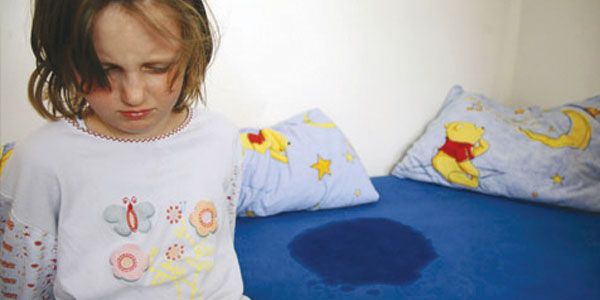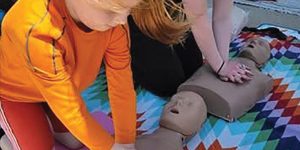
This is a very common “accident” suffered by children, adolescents and adults and causes them even more shame and psychological problems. It is called bedwetting or urinary incontinence to that “wet the bed” without being able to control it even if it is tried, and as long as it is not due to a medical illness.
Enuresis characteristics:
1) It is the repeated emission of urine during the day or night, in bed or clothes.
2) In most cases, it occurs involuntarily, although on rare occasions it is intentional.
3) Enuresis is considered when the person urinates at least twice a week for a minimum of three months, or when he or she has clinically significant discomfort or it affects in their social, academic, work or other important areas of the person’s activity.
4) There are three types of enuresis:
* Only nocturnal is the most frequent. The person only urinates during nighttime sleep. It happens almost always in the first third of the night. Sometimes it happens during the period of rapid eye movement (REM) of sleep and the child can remember a dream in which he was urinating or going to urinate.
* Daytime only, occurs while we are awake. It is more frequent after nine years of age. It usually occurs in the early afternoon on school days. Sometimes it is due to a resistance to using the toilet due to social anxiety or because of a concern related to school or sleep activity.
* Nocturnal and daytime, it is the combination of the two previous types.
Up to what age is it normal for a child to ‘wet the bed’?
If the child is very small, a diagnosis of enuresis cannot be made. The person must have reached an age when urine control is expected. The child must be at least five years old. If the child has mental retardation, he must have a mental age of at least five years. We are talking about “mental” age, so the child with a delay can have a chronological age of fifteen but his mental age is five. This must be evaluated. There are several tests to determine mental age in humans. Determining the chronological age is easy, you just have to know the date of birth of the person.
It is also very important to determine that the inability to “contain urine” is not exclusively due to the direct physiological effects of a substance such as a diuretic, nor to a medical disease such as diabetes, spina bifida, etc.
How can enuresis affect the child?
• By limiting the child’s social activities. For example, that the child cannot sleep outside the home * It affects their self-esteem
* Create a degree of social ostracism, to which they submit their peers. The child feels rejected or ridiculed by others.
* Emotional problems for the feeling of anger attached to the punishment and rejection provided by their parents and caregivers.
If your child suffers from this disorder, the first thing to do is discard any physical ailment or illness and then seek help from an expert in child psychology or a family therapist. This is almost always a symptom of other underlying emotional or family problems.
Me preocupa que mi hijo se orine en la cama
Este es un “accidente” muy común que sufren niños, adolescentes y adultos y causa en ellos aún más vergüenza y problemas psicológicos. Se le llama enuresis o incontinencia urinaria a ese «mojar la cama» sin poder controlarlo aunque se intente, y siempre y cuando no sea debido a una enfermedad médica.
Características de la enuresis:
Es la emisión repetida de orina durante el día o la noche en la cama o en la ropa.
En la mayor parte de los casos, ocurre de forma involuntaria, aunque en raras ocasiones es intencional.
Se considera enuresis cuando la persona se orina al menos dos veces por semana durante un mínimo de tres meses, o cuando tiene un malestar clínicamente significativo o sufre deterioro social, académico, laboral o de otras áreas importantes de la actividad de la persona.
Hay tres tipos de enuresis:
Sólo nocturna es la más frecuente, la persona solo se orina durante el sueño nocturno. Ocurre casi siempre en el primer tercio de la noche. A veces ocurre durante el período de movimientos oculares rápidos (REM) del sueño y el niño puede recordar un sueño en que estaba orinando o se iba a orinar.
Sólo diurna, ocurre mientras estamos despiertos. Es más frecuente tras los nueve años de edad. Suele ocurrir en las primeras horas de la tarde en los días de escuela. A veces se debe a una resistencia a usar el inodoro por ansiedad social o por una preocupación relacionada con la actividad escolar o del sueño.
Nocturna y diurna, es la combinación de los dos tipos anteriores.
¿Hasta qué edad es normal que un niño ‘moje la cama’?
Si el niño es muy pequeño, no se puede hacer un diagnóstico de enuresis. La persona debe haber alcanzado una edad en la que se espera el control de la orina. El niño debe tener al menos cinco años de edad. Si el niño tiene retraso mental, debe tener una edad mental de al menos cinco años. Estamos hablando de edad “mental”, o sea que el niño con retraso puede tener una edad cronológica de quince años pero su edad mental es de cinco. Esto debe ser evaluado. Hay varias pruebas para determinar la edad mental en los seres humanos. Determinar la edad cronológica es fácil, sólo hay que tener la fecha de nacimiento de la persona.
También es muy importante determinar que la incapacidad de «contener la orina» no se deba exclusivamente a los efectos fisiológicos directos de una sustancia como un diurético, ni a una enfermedad médica como la diabetes, espina bífida, etc.
¿Cómo puede afectar la enuresis al niño?
Al limitar las actividades sociales del niño. Por ejemplo, que el niño no pueda dormir fuera de casa
Afecta su autoestima
Crea un grado de ostracismo social al que le sometan sus compañeros. El niño se siente rechazado o ridiculizado por los demás.
Problemas emocionales en el niño por el sentimiento de cólera unido al castigo y el rechazo ejercido por sus padres y cuidadores.
Si su niño sufre de este trastorno, lo primero que debe hacer es descartar alguna dolencia física o enfermedad y después buscar ayuda psicológica de un experto en psicología infantil o un terapista familiar. Casi siempre esto es un síntoma de otros problemas emocionales o familiares subyacentes.










